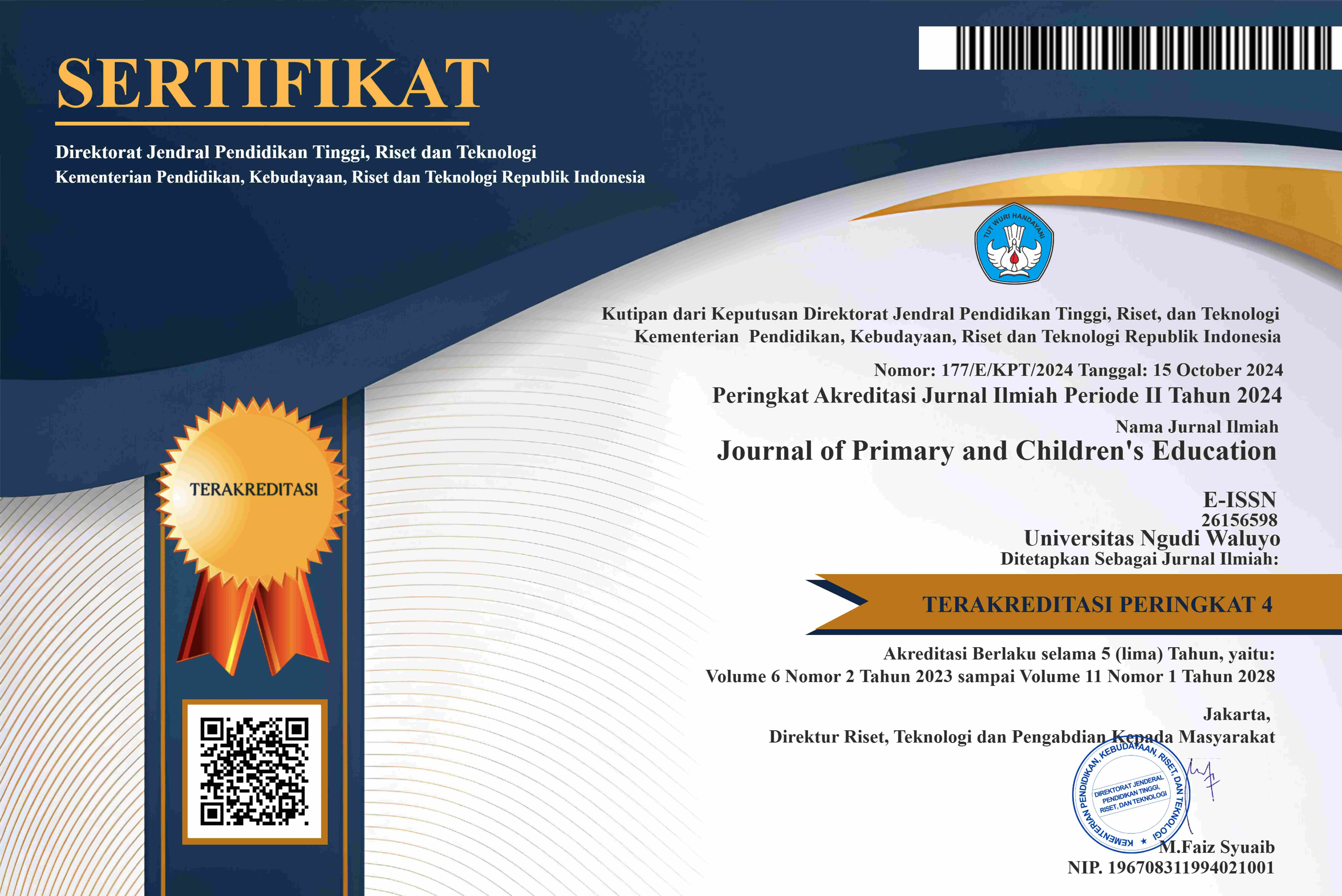ANALISIS KETERLIBATAN ORANG TUA DALAM MELAKSANAKAN PEMBELAJARAN DARING DI SEKOLAH DASAR
DOI:
https://doi.org/10.35473/jnctt.v5i1.1471Abstract
This study aims to describe the implementation of online-based learning in high grade SDN Gunungpuyuh CBM, and to describe the involvement of parents in online learning at SDN Gunungpuyuh CBM. This study used a descriptive qualitative approach and the research subjects were teachers and grade 5 students, totaling 24 students. The data collection technique used was in the form of interviews with teachers and questionnaires given to students via google form. The data analysis technique starts from data reduction, data presentation and conclusion drawing. The results of this study indicate that parental involvement in online learning in elementary schools is slightly different from face-to-face learning to online learning. When during face-to-face learning, the role of parents is not too involved. When carrying out learning, it is different from online learning, parental involvement is needed to support the spirit of student learning at home. In addition, there are several inhibiting factors that are the reason students are less enthusiastic in carrying out online learning.
References
Kuntarto, E. (2017). Keefektifan Model Pembelajaran Daring Dalam Perkuliahan Bahasa Indonesia di Perguruan tinggi. Journal Indonesian Language Education and Literature, 3(1), 101.
Syarifudin, A. S. (2020). Impelementasi Pembelajaran Daring Untuk Meningkatkan Mutu Pendidikan Sebagai Dampak Diterapkannya Social Distancing. Jurnal Pendidikan Bahasa dan Sastra Indonesia Metalingua, 5(1), 32. 7072
Yulianingsih, W., Suhanadji, S., Nugroho, R., & Mustakim, M. (2020). Keterlibatan Orangtua dalam Pendampingan Belajar Anak selama Masa Pandemi Covid-19. Jurnal Obsesi : Jurnal Pendidikan Anak Usia Dini, 5(2), 1141.
Iftitah, S. L., & Anawaty, M. F. (2020). Peran Orang Tua Dalam Mendampingi Anak Di Rumah Selama Pandemi Covid-19. JCE (Journal of Childhood Education), 4(2), 74.
Sopiah, C. (2020). Efektifitas Keterlibatan Orang Tua Dalam Ppembelajaran Anak Usia Dini Saat Pandemi Copid-19. Jurnal Jendela Bunda, 7(2), 34–44.
Alimuddin, J. (2018). Optimalisasi Peran Orang Tua Dalam Pembelajaran Tematik Integratif Di Sekolah Dasar. Prosiding Seminar Nasional: Penguatan Pendidikan Karakter Pada Siswa dalam Menghadapi Tantangan Global, 0291, 258–265.
Yanti, M. T., Kuntarto, E., & Kurniawan, A. R. (2020). Pemanfaatan Portal Rumah Belajar Kemendikbud Sebagai Model Pembelajaran Daring Di Sekolah Dasar. Adi Widya Jurnal pendidikan dasar, 10(1), 62.
Dewi, W. A. F. (2020). Dampak COVID-19 terhadap Implementasi Pembelajaran Daring di Sekolah Dasar. Edukatif : Jurnal Ilmu Pendidikan, 2(1), 56.
Putra, R., Kurniawan, S., & Rintayati, P. (2021). Dukungan orang tua terhadap pembelajaran dalam jaringan ( daring ) di sekolah dasar selama masa pandemi coronavirus. Didaktika Dwija Indria, 9(4), 1–6.
Suryadi, E., Ginanjar, M. H., & Priyatna, M. (2018). Penggunaan Sosial Media Whatsapp Pengaruhnya Terhadap Disiplin Belajar Peserta Didik Pada Mata Pelajaran Pendidikan Agama Islam (Studi Kasus Di SMK Analis Kimia YKPI Bogor). Edukasi Islami : Jurnal Pendidikan Islam, 7(01).
Published
How to Cite
Issue
Section
License
Copyright notice:
- Authors retain copyright and grant the journal right of first publication with the work simultaneously licensed under Creative Commons Attribution License that allows others to share the work with an acknowledgement of the work's authorship and initial publication in this journal.
- Authors are able to enter into separate, additional contractual arrangements for the non-exclusive distribution of the journal's published version of the work (e.g., post it to an institutional repository or publish it in a book), with an acknowledgement of its initial publication in this journal.
- Authors are permitted and encouraged to post their work online (e.g., in institutional repositories or on their website) prior to and during the submission process, as it can lead to productive exchanges, as well as earlier and greater citation of published work (The Effect of Open Access)







